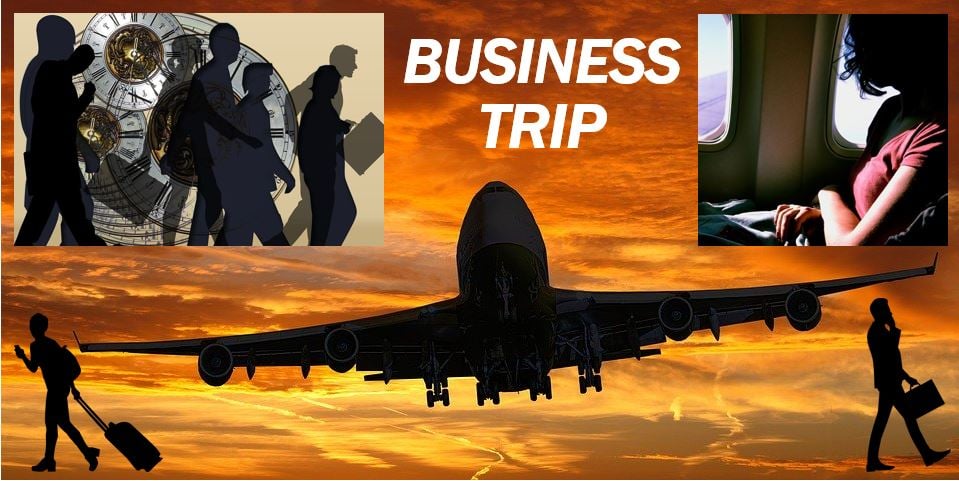- Book a Speaker
Lorem ipsum dolor sit amet, consectetur adipiscing elit. Vivamus convallis sem tellus, vitae egestas felis vestibule ut.
Error message details.

Reuse Permissions
Request permission to republish or redistribute SHRM content and materials.
Know the Compliance Risks of Short-Term Business Travel
The decision has been made. The director of sales is going to leave soon on a three-week business trip outside of the United States. The global mobility manager contacts you to confirm that a visa or work permit, formal assignment letter, secondment agreement, and other required elements of a typical, long-term assignment are not necessary. The manager says to you, “What’s the big deal? It’s just a business trip. Can’t we avoid all the paperwork and hassle since the director will be overseas only for three weeks?”
Don’t be tempted to agree.
Short-term business travel can create the same risks for your company as a long-term assignment. A short business trip could create a corporate tax liability in a foreign jurisdiction, and subject the traveler to double-income taxation, work permit scrutiny, local statutory employment laws, or require employment by the local affiliate. Taking time to understand that these risks are just as significant as in the case of a long-term assignment will allow you to help your company stay out of trouble.
Here are some examples from popular destinations for business travelers.
United Kingdom
Even a short-term business traveler can create a permanent establishment issue for his or her employer but it depends on what activities the individual is doing in the jurisdiction. The employee should not negotiate or conclude contracts on behalf of the non-U.K. employer while in the United Kingdom. Such activities can subject a company to local corporate income tax, even if unintended.
In addition, the presence of a business traveler in a jurisdiction like the U.K., even for a short period of time, can create a local income tax obligation. However, there may be some relief available to the short-term business traveler in the U.K. under the income tax treaty between the United States and United Kingdom. Note, however, that although the short-term business traveler may be exempt from U.K. income taxes, it is not entirely clear whether he or she is subject to U.K. national insurance contributions while working there. Generally, the answer is no, under the relief provisions of the Totalization Agreement between the two countries. However, each case should be analyzed to confirm that this relief is indeed available.
Short-term business travelers working in the U.K. for no more than six months in any 12-month period may enter the country under the business visitor category. However, if the individual is a national of a designated “visa country” then he or she is required to obtain a visa before traveling to the U.K.
Individuals who enter the U.K. on a business visitor visa must be based outside of the U.K. and must not receive a salary from a U.K. source. Individuals on a business visitor visa must not intend to produce goods or provide services within the U.K. Notwithstanding, these individuals are permitted to conduct certain limited activities, including attending meetings and briefings, fact-finding, and negotiating or making contracts with local businesses to buy or sell goods or services.
Business travel may trigger a permanent establishment depending on the type of services an individual performs in Brazil and the level of authority that is granted under his or her particular visa. Similar to the U.K., the short-term business traveler should not negotiate and conclude contracts on behalf of his or her employer.
Although there is no income tax treaty between the United States and Brazil, under general Brazilian tax principles if the individual is in Brazil for more than 183 days, the individual becomes a tax resident in Brazil and is liable for tax on his or her worldwide income.
Short-term business travelers generally will not be subject to the National Institute for Social Security contributions or the Government Severance Fund for Employees. Brazilian legislation in principle requires that payroll taxes for these contributions be collected with respect to any amounts paid to an individual, including amounts paid abroad, even if the individual is present in Brazil for only a short period of time. Practically, however, companies do not collect payroll taxes for short-term business travelers as these individuals remain on the home country payroll.
A company will also need to determine the appropriate visa; determining which visa applies to the short-term business traveler will largely depend on why the employee is going to Brazil.
The choices are a business visa, a technical visa or a temporary visa. A business visa is for an individual who will be going back and forth to Brazil on short stays. The business visa is good for 90 days, with the ability to extend the visa for an additional 90 days. A technical visa is normally used when the parties are unrelated (e.g., technicians of an equipment manufacturer sent to train a Brazilian customer’s employees). In order to obtain a technical visa, there should be a formal agreement between the non-Brazilian company and the Brazilian entity showing that the services are being performed in Brazil to provide a transfer of technology, technical assistance, manpower, and so forth. A technical visa is good for a stay of up to 90 days, although there is one type of technical visa that allows for a stay for up to one year. The technical visa can, in theory, be extended for an additional period of time.
If the short-term business traveler does not qualify for either a business visa or a technical visa, he or she will need to obtain a temporary visa. However, in order to get a temporary visa, the employee must become employed by a Brazilian entity and enter into a Brazilian employment contract, which may not be ideal in this situation.
There is a risk of triggering a permanent establishment by sending an employee to China, even for a short-term business visitor. In the event there is no applicable tax treaty between China and the jurisdiction sending the short-term business traveler to China, the concept of “establishment or place” applies (this is the Chinese concept equivalent to permanent establishment). The concept of establishment or place is broader than permanent establishment, so any business activity in China on behalf of an offshore employer could potentially trigger an establishment or place during a visit to China, subjecting the non-Chinese employer to tax on its China-source income.
Alternatively, if there is an applicable income tax treaty, as is the case where a U.S. short-term business traveler is sent to China, the interpretations of permanent establishment issues and other administrative tax notices will apply. Under the protection of the tax treaty, if the short-term business traveler does not negotiate or conclude contracts on behalf of the non-Chinese employer and the individual stays in China for about 3-4 days, there should not be a permanent establishment issue for the offshore employer.
Separately, because the short-term business traveler will likely not be a foreign national employee of the local Chinese entity, he or she will likely not be subject to social security taxes on their Chinese-source income.
Generally, individuals entering China are required to obtain work permits only if they will be staying in China for more than three months in a calendar year. However, shorter term stays may require a work permit as well, depending on the particular province (e.g., Shanghai). Some cities in China require a local employment contract in order to obtain a work permit. Executing a local employment contract will subject the individual to local Chinese employment law, which is not desirable from the standpoint of the employer who sends the short-term business traveler into China since Chinese employment law is very pro-employee.
Notwithstanding these general rules, new guidance was issued for foreign nationals performing short-term work assignments in China, which is effective January 1, 2015.
The guidance provides details on what circumstances will be considered a short-term work assignment and which circumstances will not. If the circumstances of the business travel qualify as a short-term work assignment, and the stay in China is for no more than 90 days, the foreign national must obtain a Z work visa to enter China. Otherwise, an M or F visa will be required.
The permanent establishment risks associated with sending a short-term business traveler to India are complex. To the extent that the short-term business traveler does not have the authority to conclude contracts while working in India, then those facts will be helpful to mitigate any permanent establishment risk. However, to the extent that the short-term business traveler will perform services while in India, the principal corporate income tax exposure is that a permanent establishment exists in India if a short-term business traveler performs services in India for a related party (e.g., the Indian affiliate) for even one day. Generally, the only way for a short-term business traveler to not create a permanent establishment is to be seen as performing services for the nonresident enterprise and not for the local affiliate (subject to a few additional limited circumstances).
If the short-term business traveler is in India for purposes of providing services to third parties (e.g., contractors or customers), then the permanent establishment threshold is 90 days. That 90-day threshold is cumulative for all employees of the employer who are in India performing services for the third party during any 12-month period. Accordingly, the individual’s employer would need to monitor the time spent in country by non-Indian personnel for each contractor or customer.
The short-term business traveler may be exempt from income tax in India so long as his or her stay does not exceed 90 days, as prescribed by the Income Tax Act of 1961. If an individual is not exempt from tax under the Income Tax Act of 1961, then the short-term business traveler may be able to rely on the U.S.-India Income Tax Treaty. As long as the short-term business traveler does not create a permanent establishment in India, he or she will likely be exempt from Indian income tax.
Short-term business travelers will be required to apply for a visa prior to entering India. The type of visa required will depend on the purpose of the individual’s trip. If the individual will establish or explore the possibility of establishing an industrial or business venture, or if the individual wishes to purchase and/or sell products in India, then he or she will require a business visa. A business visa will be endorsed with either “each stay not to exceed 6 months and registration not required” or “registration required within 14 days.” For all other types of activities, an employment visa is required. An employment visa may be granted for an initial period of two years with the possibility to obtain a 12-month extension with an ability to stay in India up to five years. Furthermore, the employment visa will require the short-term business traveler to be employed by an Indian entity and enter into an Indian employment contract.
So what is the big deal? In the event of noncompliance, your company and your employee may be subject to additional taxation, and there is the possibility that your employee may be stopped at the border and prohibited from entering the country, resulting in a lost opportunity or lost business. In addition, your company may be subject to penalties, fines and other legal action from a foreign government. This may not only be a financially costly result but may also create bad publicity. The last thing you want is for a short-term business traveler to do something that would negatively impact your company’s reputation among not only your customers but also your suppliers and other business partners.
To reduce these risks for short-term business travelers, you should take the following steps:
- Communicate to all stakeholders in your company the potential for these risks, and protect against them by having a robust short-term business travel policy.
- Require a compliance checklist in connection with short-term business travel.
- Establish travel review policies.
- Limit the activities of the business traveler while they are abroad.
- Get regular updates on changes in local laws which may impact your short-term business travelers.
- Consult with tax, employment and immigration experts.
Tulsi Patel is a global equity services associate at international law firm Baker & McKenzie.
Related Content

Why AI+HI Is Essential to Compliance
HR must always include human intelligence and oversight of AI in decision-making in hiring and firing, a legal expert said at SHRM24. She added that HR can ensure compliance by meeting the strictest AI standards, which will be in Colorado’s upcoming AI law.

A 4-Day Workweek? AI-Fueled Efficiencies Could Make It Happen
The proliferation of artificial intelligence in the workplace, and the ensuing expected increase in productivity and efficiency, could help usher in the four-day workweek, some experts predict.
Advertisement

Artificial Intelligence in the Workplace
An organization run by AI is not a futuristic concept. Such technology is already a part of many workplaces and will continue to shape the labor market and HR. Here's how employers and employees can successfully manage generative AI and other AI-powered systems.
HR Daily Newsletter
New, trends and analysis, as well as breaking news alerts, to help HR professionals do their jobs better each business day.
Success title
Success caption
- SUGGESTED TOPICS
- The Magazine
- Newsletters
- Managing Yourself
- Managing Teams
- Work-life Balance
- The Big Idea
- Data & Visuals
- Reading Lists
- Case Selections
- HBR Learning
- Topic Feeds
- Account Settings
- Email Preferences
The Hidden Benefits of Short-Term Business Travel
- Andy Molinsky
- Melissa Hahn

Make the most of even the briefest trip.
Much has been written about long-term expatriate assignments , but for many of us, a more common “assignment” is the short-term business trip — that four-day jaunt to Dubai or the there-and-back trip to Buenos Aires. Too often, these whirlwind treks leave us numb. As we move from one hotel chain to another and order the same Starbucks drink in London that we do in Shanghai or Tokyo, it can feel like just another business trip as opposed to a personally meaningful cross-cultural adventure.
- Andy Molinsky is a professor of Organizational Behavior and International Management at Brandeis University and the author of Global Dexterity , Reach , and Forging Bonds in a Global Workforce . Connect with him on LinkedIn and download his free e-booklet of 7 myths about working effectively across cultures .
- Melissa Hahn teaches intercultural communication at American University’s School of International Service. Her new book, Forging Bonds in a Global Workforce (McGraw Hill), helps global professionals build effective relationships across cultures.
Partner Center
Official websites use .gov A .gov website belongs to an official government organization in the United States.
Secure .gov websites use HTTPS A lock ( A locked padlock ) or https:// means you've safely connected to the .gov website. Share sensitive information only on official, secure websites.
- Create Account
B-1 Temporary Business Visitor
You may be eligible for a B-1 visa if you will be participating in business activities of a commercial or professional nature in the United States, including, but not limited to:
- Consulting with business associates
- Traveling for a scientific, educational, professional or business convention, or a conference on specific dates
- Settling an estate
- Negotiating a contract
- Participating in short-term training
- Transiting through the United States: certain persons may transit the United States with a B-1 visa
- Deadheading: certain air crewmen may enter the United States as deadhead crew with a B-1 visa
You must demonstrate the following in order to be eligible for a B-1 visa:
- The purpose of your trip is to enter the United States for business of a legitimate nature
- You plan to remain for a specific limited period of time
- You have sufficient funds to cover the expenses of the trip and your stay in the United States
- You have a residence outside the United States that you have no intention of abandoning, as well as other binding ties that will ensure your return abroad at the end of the visit
- You are otherwise admissible to the United States
For information on applying for a B-1 visa, see the “Department of State” link.
Noncitizens seeking a B-1 visa from certain countries may be able to enter the United States without a visa. For information about exemptions from the visa requirements, see the Customs & Border Protection page.
If you are in the United States in another valid nonimmigrant status, you may be eligible to change to B-1 status. To change to B-1 status, file a Form I-539, Application to Extend/Change Nonimmigrant Status . For more information, see the Change my Nonimmigrant Status page.
At the port of entry, an immigration official must authorize your admission to the United States, and, if you are eligible for admission, you may be admitted initially for the period necessary to carry out your business activities, up to a maximum period of 1 year. If you who wish to stay beyond the time indicated on the Form I-94 without departing from the United States, you must file Form I-539, Application to Extend/Change Nonimmigrant Status, and submit any required supporting documents to USCIS. For more information, see the Extend my Stay page.
Your spouse and children are not eligible for a dependent visa. Each of your dependents who will be accompanying or following to join you must apply separately for a B-2 visa and must follow the regulations for that visa.
Certain personal or domestic servants accompanying or following to join individuals in a B, E, F, H, I, J, L, or TN nonimmigrant classification, personal or domestic servants of U.S. citizens who have a permanent home or are stationed in a foreign country, as well as certain employees of foreign airlines, may be eligible for B-1 nonimmigrant status if their activities in the United States are in connection with their foreign employment. Such activities are not considered, for purposes of the B-1 classification, to be prohibited local “employment” or “labor for hire” within the United States.
While these B-1 nonimmigrants are not required to obtain an Employment Authorization Document (EAD) from USCIS before engaging in their approved B-1 activities, they may still receive an EAD upon request by filing Form I-765. Note, however, that if such persons engage in activities outside their B-1 nonimmigrant status, such as working for another employer in the United States, they will be found to have violated their B-1 nonimmigrant status. They also may not remain in the United States for longer than the authorized period of stay in B-1 nonimmigrant status.
- Search Please fill out this field.
- Manage Your Subscription
- Give a Gift Subscription
- Newsletters
- Sweepstakes
- Travel Tips
Why Short-term Business Travel Is Good for You
Business travel can boost confidence and creativity, among other benefits, according to research.
:max_bytes(150000):strip_icc():format(webp)/Stacey-Leasca-2000-631fabdcfe624115bea0ce8e25fdec96.jpg)
Businesses are ready for those face-to-face meetings once again. According to the Global Business Travel Association, spending on business travel is expected to grow to $1.8 trillion globally by 2027.
As the analysis further noted, North America is expected to see business travel grow by more than 23% by 2026. If you're among those employees being asked to travel for work, know that this rebound could be really good for you personally, too.
As the Harvard Business Review noted in a 2016 story, business travel comes with plenty of benefits, namely a major boost in confidence and creativity. The story pointed to several research studies, which show that people tend to be at their most creative and exhibit "cognitively flexible" behavior when they travel to a new setting. The Harvard Business Review explained that this occurs not just with the big things, like being around new people discussing new ideas, but in the small things too, like having to order off new menus you may be unfamiliar with or having to navigate a new city, making your mind work in whole new ways.
Again, as the authors of the article note, this isn't just with long-term travel. In fact, they write, "short-term travel can often test people more than long-term assignments," as companies may not offer what they would for long-term support, such as culture and language courses for employees going to a new country for weeks or months on end, pushing the shorter-term business traveler to take on these tasks on their own.
Need more of a reason to take that quick travel assignment? Just think of the perks more literally. Not only will you experience a new destination, build confidence, and interface with clients more meaningfully, but you could also rack up points and miles with airlines, hotels, and car rental services to use on your personal travels. You could even utilize those personal points to tack on a day or two at the end of your meetings to kick back and relax in your new destination. Who knows, maybe you'll become a " bleisure " (you know, business-meets-leisure) travel expert in no time.
Related Articles

- Global (EN)
- Albania (en)
- Algeria (fr)
- Argentina (es)
- Armenia (en)
- Australia (en)
- Austria (de)
- Austria (en)
- Azerbaijan (en)
- Bahamas (en)
- Bahrain (en)
- Bangladesh (en)
- Barbados (en)
- Belgium (en)
- Belgium (nl)
- Bermuda (en)
- Bosnia and Herzegovina (en)
- Brasil (pt)
- Brazil (en)
- British Virgin Islands (en)
- Bulgaria (en)
- Cambodia (en)
- Cameroon (fr)
- Canada (en)
- Canada (fr)
- Cayman Islands (en)
- Channel Islands (en)
- Colombia (es)
- Costa Rica (es)
- Croatia (en)
- Cyprus (en)
- Czech Republic (cs)
- Czech Republic (en)
- DR Congo (fr)
- Denmark (da)
- Denmark (en)
- Ecuador (es)
- Estonia (en)
- Estonia (et)
- Finland (fi)
- France (fr)
- Georgia (en)
- Germany (de)
- Germany (en)
- Gibraltar (en)
- Greece (el)
- Greece (en)
- Hong Kong SAR (en)
- Hungary (en)
- Hungary (hu)
- Iceland (is)
- Indonesia (en)
- Ireland (en)
- Isle of Man (en)
- Israel (en)
- Ivory Coast (fr)
- Jamaica (en)
- Jordan (en)
- Kazakhstan (en)
- Kazakhstan (kk)
- Kazakhstan (ru)
- Kuwait (en)
- Latvia (en)
- Latvia (lv)
- Lebanon (en)
- Lithuania (en)
- Lithuania (lt)
- Luxembourg (en)
- Macau SAR (en)
- Malaysia (en)
- Mauritius (en)
- Mexico (es)
- Moldova (en)
- Monaco (en)
- Monaco (fr)
- Mongolia (en)
- Montenegro (en)
- Mozambique (en)
- Myanmar (en)
- Namibia (en)
- Netherlands (en)
- Netherlands (nl)
- New Zealand (en)
- Nigeria (en)
- North Macedonia (en)
- Norway (nb)
- Pakistan (en)
- Panama (es)
- Philippines (en)
- Poland (en)
- Poland (pl)
- Portugal (en)
- Portugal (pt)
- Romania (en)
- Romania (ro)
- Saudi Arabia (en)
- Serbia (en)
- Singapore (en)
- Slovakia (en)
- Slovakia (sk)
- Slovenia (en)
- South Africa (en)
- Sri Lanka (en)
- Sweden (sv)
- Switzerland (de)
- Switzerland (en)
- Switzerland (fr)
- Taiwan (en)
- Taiwan (zh)
- Thailand (en)
- Trinidad and Tobago (en)
- Tunisia (en)
- Tunisia (fr)
- Turkey (en)
- Turkey (tr)
- Ukraine (en)
- Ukraine (ru)
- Ukraine (uk)
- United Arab Emirates (en)
- United Kingdom (en)
- United States (en)
- Uruguay (es)
- Uzbekistan (en)
- Uzbekistan (ru)
- Venezuela (es)
- Vietnam (en)
- Vietnam (vi)
- Zambia (en)
- Zimbabwe (en)
- Financial Reporting View
- Women's Leadership
- Corporate Finance
- Board Leadership
- Executive Education
Fresh thinking and actionable insights that address critical issues your organization faces.
- Insights by Industry
- Insights by Topic
KPMG's multi-disciplinary approach and deep, practical industry knowledge help clients meet challenges and respond to opportunities.
- Advisory Services
- Audit Services
- Tax Services
Services to meet your business goals
Technology Alliances
KPMG has market-leading alliances with many of the world's leading software and services vendors.
Helping clients meet their business challenges begins with an in-depth understanding of the industries in which they work. That’s why KPMG LLP established its industry-driven structure. In fact, KPMG LLP was the first of the Big Four firms to organize itself along the same industry lines as clients.
- Our Industries
How We Work
We bring together passionate problem-solvers, innovative technologies, and full-service capabilities to create opportunity with every insight.
- What sets us apart
Careers & Culture
What is culture? Culture is how we do things around here. It is the combination of a predominant mindset, actions (both big and small) that we all commit to every day, and the underlying processes, programs and systems supporting how work gets done.
Relevant Results
Sorry, there are no results matching your search., kpmg link business traveler.
Mitigate compliance risks for frequent travelers.

As businesses continues to globalize and the hunt for talent intensifies, short-term business travel creates risks for employees and the company. KPMG LINK Work Force quantifies these risks while providing the right insight and duty-of-care to your traveling talent.
Pre-travel risk assessments and post-travel updates provide ongoing business support and compliance. App-based employee visibility and optional location tracking along with travel provider integration provide automated alerts related to projected compliance risks.
KPMG LINK Work Force connects directly with travel and expense systems creating automated assessments at travel booking. Our alliance with International SOS aligns safety and security with upcoming travel allowing you to provide the duty of care required by your employees throughout their trip.
Here's how we can help:
- Immediate risk identification: Identify, flag, and track domestic and international business travelers, posted workers, and compliance risks prior to travel
- Automated routing and communication: Get the right risk, with the right information, in front of the right person
- Workflow: Key employee milestone metrics provide transparency while risks are rectified
- Don’t stop business: Configuration allows for workflow to mirror your travel and business procedures keeping your people moving
- Work anywhere: Ongoing tracking and mobile application allow you to assess and continually monitor your “work anywhere” population
- Travel and payroll data: Travel provider connections and alliances with companies like VisaHQ gather more data more quickly while payroll connections offer direct state-to-state wage sourcing.
- Travel alliance: An alliance with International SOS further integrates employee data with travel and security
Explore more
Popular category topics
Work anywhere, together
Framework to support the workforce of the future
Meet our team

Explore other services tailored to your business
Thank you for contacting KPMG. We will respond to you as soon as possible.
Contact KPMG
By submitting, you agree that KPMG LLP may process any personal information you provide pursuant to KPMG LLP's Privacy Statement .
Job seekers
Visit our careers section or search our jobs database.
Use the RFP submission form to detail the services KPMG can help assist you with.
Office locations
International hotline
You can confidentially report concerns to the KPMG International hotline
Press contacts
Do you need to speak with our Press Office? Here's how to get in touch.
Safe Travels: How to Avoid Risk on Short Business Trips

In the fast-paced business world, executives are often required to travel overseas for short-term assignments. But many need to realize that such trips could come at a cost, with potential tax obligations and compliance issues waiting around every corner.
The risks are numerous, from double taxation to work permit scrutiny and local labor law non-compliance, with tax and immigration authorities tightening their regulatory oversight.
So, if you’re a frequent business traveler or a company looking to send employees abroad, it’s time to discover how to avoid costly mistakes and stay compliant with local regulations.
The Dangers of Short-term Global Business Travel
It’s easy to ignore or not worry about the risks of a brief overseas work trip. “It’s only three weeks, what’s the worst that can happen?” you tell yourself.
However, there are serious consequences to ignoring the potential risks involved. Below are six of the biggest challenges.
- Permanent Establishment: A short business trip can create a permanent establishment problem for your company. For example, in the UK, if your employee negotiates or finalizes deals for your non-UK company, it could lead to your business being liable for local income tax. It can also result in a damaged reputation, frequent audits, regulatory problems, immigration issues, and more.
- Labor Laws: Short-term business travel is typically governed by the labor laws of the employee's home country. However, in the European Union (EU), employers in the EU and outside the region must observe the Posted Workers Directive. When sending an employee to an EU country, it’s crucial to comply with labor regulations such as minimum pay, annual leave, and safety measures to avoid severe penalties.
- Tax Compliance: Tax regulations are complex and vary depending on the jurisdiction. Aligning with all compliance requirements in reporting all your tax obligations in the countries your employees visit is critical. For instance, in Canada, one day of travel into the country triggers tax obligations for the employee and their company.
- Personal Safety: Before going on a short business trip, companies should be aware of the risks associated with personal safety. The degree of this risk can vary significantly depending on the destination. Business travelers need to stay informed and take necessary precautions including secure transport options and safeguarding personal belongings.
- Cultural Differences: In today's global business landscape, short-term travelers frequently engage with diverse cultures, customs, and languages. Each country has its own business culture, and a lack of understanding can lead to misunderstandings and missed opportunities. For example, the way Spanish companies conduct meetings will vary from Nigerian companies, and negotiation tactics will vary significantly from one region to another.
- Cyber and Data Security: Short-term business travelers must remain vigilant in protecting sensitive data. Connecting to unsecured public Wi-Fi networks or using untrusted devices can expose valuable information to cyber threats. Using virtual private networks (VPNs), employing strong passwords, and practicing data encryption is essential to safeguard confidential data during business travels.
How to Minimize Risks for Short-term Business Travel
Global business travel is a valuable tool to grow your company, build relationships, and access new markets—but it does have the potential to derail your business. Companies can take the following steps to lower the risks of short-term business travel.
Partner with an Employer of Record
An Employer of Record (EOR) can support a short-term business traveler and their company to meet compliance with local laws and regulations while maximizing efficiency and productivity during the trip. Their services include, but are not limited to, securing proper work visas, drafting compliant employee contracts, and administering benefits that align with local regulations.
Consult with Tax, Employment, and Immigration Experts
Tax experts can manage tax liabilities, ensuring proper reporting and minimizing the chances of penalties. Immigration specialists can assist with visa requirements, work permits, and compliance with immigration laws, avoiding potential legal issues and ensuring smooth entry and exit for employees. Employment professionals can offer advice on payroll obligations, benefits, and local labor laws, helping companies stay compliant and avoid penalties.
Create a Pre-Travel Checklist
A pre-travel checklist can help companies mitigate compliance and risks in short-term travel. It verifies visa requirements, confirms insurance coverage, assesses risks, and ensures adherence to safety protocols. By following this checklist, companies address compliance issues, minimize risks, and ensure smooth travel experiences.
Travel Smarter
To minimize the risks of short-term business trips, companies should take proactive steps and seek help from global professionals. By doing so, you can protect employees, preserve the company's reputation, and ensure successful global operations.
- United States
- United Kingdom
- Philippines
- Employer of Record
- Employment Compliance
- Global Immigration
- Global Taxes
- Global Payroll
- Employee Benefits
- Equity Management
Why Global Expansion
- How we’re different
- Data Security & Privacy
- CountryPedia
- Salary Calculator
- Thought Leadership
- Become a Partner
Language selection
- Français fr
Business visitors: Attend conferences, events and meetings in Canada
How to apply for a visa or electronic travel authorization for short-term business visits. What to do when inviting foreign business guests to Canada for an event.
Most requested
- Check processing times
- Get answers to questions about visas and electronic travel authorizations (eTAs)
Services and information
Business visitor.
Find out if you qualify as a business visitor, if you need a visa or an electronic travel authorization, about letters of invitation and other documents you may need, and how to plan for your visit to Canada
Canadian business or event organizer
Find out how to bring business guests to Canada, how to register your event with us, how to prepare a letter of invitation, what you need to know about protocol and border requirements, and more

Before you arrive
Find out what you can bring to Canada when you cross the border.
Page details
Official websites use .gov A .gov website belongs to an official government organization in the United States.
Secure .gov websites use HTTPS A lock ( A locked padlock ) or https:// means you’ve safely connected to the .gov website. Share sensitive information only on official, secure websites.
- Search ITA Search
- Market Overview
- Market Challenges
- Market Opportunities
- Market Entry Strategy
- Agricultural Sector
- Financial Technology
- Aircraft and Related Parts
- Industrial Machine Tools
- Cloud Computing
- Medical Devices
- Civil Nuclear Power
- Defense Procurement
- Semiconductors
- Pharmaceuticals
- Trade Barriers
- Import Tariffs
- Import Requirements and Documentation
- Labeling/Marking Requirements
- U.S. Export Controls
- Temporary Entry
- Prohibited & Restricted Imports
- Customs Regulations
- Trade Standards
- Trade Agreements
- Licensing Requirements for Professional Services
- Distribution & Sales Channels
- Selling Factors and Techniques
- Protecting Intellectual Property
- Trade Financing
- Selling to the Public Sector
- Business Travel
- Investment Climate Statement
Business Customs
An understanding of Japanese business and social practices goes a long way in establishing and maintaining successful business relationships in Japan. Perceived indifference to local business practices may be interpreted as a lack of commitment on the part of the exporter and may lead to misunderstandings and lost business opportunities. One should not assume that because meetings and correspondence are carried out in English that Western social and business norms apply.
Japanese society is complex, structured, hierarchical and group-oriented. It places strong emphasis on maintaining harmony and avoiding direct confrontation. Japanese social and cultural norms tend to be group-oriented rather than focused on the individual. In building relationships (which often precede a first-time sale or an agreement) one should emphasize trust, confidence, loyalty, and commitment for the long term.
Group decision-making is important in Japan and has been generally described as a “bottom-up” exercise rather than “top-down.” Family businesses founded since WWII and smaller second-tier firms are often exceptions to this rule. However, even in large family firms, where decisions are made at the top, company members have a sense of participation. This type of group decision-making requires time. Recognizing that it takes a longer time to cultivate business relationships in Japan than in the United States, U.S. business executives should not expect to close deals in just a few days. Consistent follow-up is vital. Likewise, U.S. businesspeople should recognize the importance of working with the staff level of their Japanese counterparts and not exclusively with the executive level.
Gift giving is expected on some business occasions in Japan. Regional U.S. gifts or company-logo gifts are appropriate. Quality is important, but the gift does not have to be expensive – it is the sentiment and relationship implied by the gift rather than its intrinsic value that is significant. Therefore, the packaging of the gift is as important as the gift itself and should be done professionally. In Japan, sets of four are considered unlucky (the number four is pronounced the same as the word for death). Gifts that can be shared among a group are appropriate.
Business travelers to Japan should make sure to bring a large supply of business cards (with their title) when they come to Japan; printing bilingual cards is a nice touch. Business cards, still in wide use despite rapid digitalization, are exchanged to formalize the introduction process and establish the status of the parties relative to each other. Japanese bow when greeting each other but will expect to shake hands with foreign executives. A slight bow in acknowledgment of a Japanese bow is appreciated. Japanese executives deal on a last (family) name basis in business relationships, and initial business and social contacts are characterized by politeness and formality.
Business travelers visiting a Japanese firm for the first time should be accompanied by an interpreter or bilingual assistant. Many Japanese executives and decision-makers do not speak English, although they may be able to greet visitors in English and read English product literature relevant to their business or industry expertise. Although English is a required subject in Japan’s secondary school curriculum, generally, English listening and speaking skills tend to be weaker than reading and writing skills for Japanese. Thus, the Japanese side in a business meeting generally expects visitors to bring an interpreter if they are serious about doing business. Although the cost of hiring an interpreter can be high, bringing an interpreter shows that a visiting firm is serious in its commitment to the Japanese market.
The first visit to a Japanese firm generally serves as a courtesy call to introduce U.S. executives and their company and allows the U.S. side to begin to evaluate a target company and its executives as potential business partners. A request to meet only with English-speaking staff can mean missing the opportunity to become acquainted with higher-ranking executives.
Written contract, even if less detailed than a contract between two U.S. companies, is essential to meet legal, tax, customs, and accounting requirements in Japan. Contractual commitments are perceived as representing long-term relationships so the terms and conditions, for example, whether to grant exclusive rights, should be considered carefully.
Japan’s travel infrastructure is on a par with that of the United States. A wide range of business travel and tourist services are available. For additional information on traveling to Japan, contact the Japan National Tourist Organization (JNTO) in New York at tel: (212) 757-5640; fax: (212) 307-6754, or visit JNTO’s website .
U.S. business travelers to Japan seeking appointments with U.S. Embassy Tokyo officials should contact the Commercial Section in advance. The Commercial Section can be reached by e-mail at: [email protected].
Travel Advisory
To access the most up-to-date travel and safety information, including regarding Covid-19, please refer to the State Department‘s Country-Specific Information for Japan . U.S. citizens can also obtain up-to-date safety and security information by calling 1-888-407-4747 toll-free within the U.S. and Canada, or by calling a regular toll line, 1-202-501-4444, from other countries.
Japan has long been noted for its low crime and safe streets. Crimes against U.S. citizens in Japan are rare. Crime is at levels well below the U.S. national average. Violent crime is extremely rare but does exist. Incidents of pickpocketing of foreigners in crowded shopping areas, on trains and at airports have been a sporadic concern. Complaints of robberies committed after a victim has been drugged from a spiked drink are increasing. Some of Tokyo’s entertainment and nightlife districts - in particular, the Roppongi and Kabuki-cho areas - are considered high-risk areas for crime, and the Embassy receives reports of drink spiking, credit card fraud, extortion, and even assault in these districts.
Some U.S. citizens believe that Japanese police procedures appear to be less sensitive and responsive to a victim’s concerns than would be the case in the United States, particularly in cases involving domestic violence and sexual assault. Few victims’ assistance resources, or battered person’s shelters exist, even in major urban areas, and facilities are generally unavailable in rural areas. See also information on staying safe in Japan from JNTO .
Visa requirements
A U.S. passport, valid for the duration of stay, is necessary to enter and travel in Japan. By Japanese law, non-residents are required to carry their passports (or their Resident Card if staying longer than 90 days) at all times.
A visa is not required for short-term business visits (up to 90 days). However, please note that Japan requires an onward/return ticket for “visa free” stays of up to 90 days. A work or investor visa may take up to two months to obtain. Immunization and health certificates are not required. Foreigners who will be mid to long-term residents must arrive in Japan with an appropriate visa, and upon arrival at the major airports in Japan, immigration authorities will issue a Resident Card. Residents are required to register their address at the nearest municipal office.
Upon arrival, going through both immigration and customs checks are essentially a formality for U.S. business travelers as long as passport and air tickets are in order. All foreign nationals entering Japan, with the exemption of certain categories listed below, are required to provide fingerprint scans and be photographed at the port of entry. This requirement does not replace any existing visa or passport requirements. Foreign nationals exempt from this new requirement include special permanent residents, persons under 16 years of age, holders of diplomatic or official visas, and persons invited by the head of a national administrative organization.
Passengers are advised to exchange some U.S. dollars for yen before leaving the airport.
U.S. companies that require travel of foreign businesspersons to the United States should be advised that security evaluations are handled via an interagency process. Visa applicants should go to the following links:
State Department Visa Website
Consular Section of the U.S. Embassy Tokyo
The currency in Japan is the Japanese Yen.
Telecommunications/Electronics
Japan’s telecommunications system, one of the most developed in the world, is both efficient and convenient. International calls can be made from private cell phones, public International Direct Dialing (IDD) phones, or hotel IDD phones. The main mobile carriers in Japan are NTT DoCoMo, KDDI, and Softbank; e-commerce giant Rakuten is building out a fully virtualized mobile network. All currently offer, and are expanding, 5G services. Many U.S. carriers offer plans. Broadband and WiFi services are easy to procure, and free public WiFi is widely available in major cities. Nearly all hotels provide free WiFi services. Many restaurants and cafés also provide free WiFi for customers. More telecommunications information can be found on the JNTO website, with insights on telephone use and WiFi.
Japan uses an electric current of 100 volts, and a frequency of 50 Hertz in eastern Japan, or 60 Hertz in Western Japan (including Nagoya, Kyoto, and Osaka). Appliances from Europe, Australia, or Southeast Asia will require an adaptor and may require a transformer depending on the electric device; most U.S. appliances do not require an adaptor. More information on plugs and electricity can be found on the JNTO website .
Transportation
Japan has a system of modern highways and roads linking all parts of country. However, traffic conditions on expressways and in cities are often very congested. Most major intercity highways operate on a toll basis, and tolls can be extremely expensive, making passenger train travel very competitive, especially for international visitors. Japan boasts the world’s densest and most modern passenger railroad system, with fast, frequent services to all parts of the country. Japan’s famous Shinkansen high-speed rail links Tokyo with Japan’s major business centers and beyond. All of Japan’s large cities have highly developed subway and commuter train service. Taxi service is widely available.
The national language of Japan is Japanese (Nihongo) and is spoken and understood all over the country. English is a required subject in Japanese high schools, and it is by far the most widely known foreign language in Japan. International business correspondence and negotiations in Japan are almost always conducted in English. Most Japanese, including business executives, have a limited understanding and command of spoken English, although there are of course exceptions. Japanese business executives often read English much better than they can speak it or understand it when spoken. It is advisable, therefore, to be accompanied by a competent professional interpreter to all business meetings, especially an initial contact where you might be unsure of your counterpart’s mastery of English.
Aside from the area in the immediate vicinity of the Fukushima Daiichi Nuclear Power plant, crippled by the disaster in 2011, Japan poses no medical health risks to business travelers. While medical care in Japan is good, English-speaking physicians and medical facilities that cater to
U.S. citizens’ expectations are expensive and not very widespread. Japan has a national health insurance system, which is only available to non-citizens with long-term visas for Japan. National health insurance does not pay for medical evacuation or medical care outside of Japan. Medical caregivers in Japan require payment in full at the time of treatment or concrete proof of ability to pay before treating those who are not covered by the national health insurance plan. Most major credit cards are accepted.
State Department‘s Country Health Information – Japan
Visitors to Japan should carry their prescription or non-prescription medication in their original containers along with a copy of their prescription. Some medications that are commonly used in the United States are illegal in Japan. Adderall, for example, is strictly prohibited because it contains amphetamines, and its possession or importation is a crime. Another example of an amphetamine drug that is illegal in Japan is Vyvance, commonly prescribed for attention deficit disorder by U.S. physicians. It is also illegal to bring into Japan some over-the-counter medicines commonly used in the United States, including inhalers and some allergy and sinus medications. Specifically, products that contain stimulants (medicines that contain pseudoephedrine, such as Actifed, Sudafed, and Vicks inhalers) or codeine are prohibited. Also, shipping narcotic analgesic medications into Japan is limited to institutions designated by the Japanese government. Individuals cannot legally have narcotics mailed or shipped into Japan. Medical marijuana, even with a U.S. prescription, is strictly forbidden and those attempting to bring it into Japan will be arrested and prosecuted.
For more information on bringing medication (prescription or over-the-counter) into Japan, please refer to US Embassy & Consulates in Japan .
Local time, business hours, and holidays
Local Time: Japan is 14 hours ahead of U.S. Eastern Standard Time (EST) and 13 hours ahead of Eastern Daylight Time (EDT) from April to October. Consequently, 8:00 a.m. EST in New York City corresponds to 10:00 p.m. the same day in Tokyo. 8:00 p.m. EST in New York City corresponds to 10:00 a.m. the next day in Tokyo. Japan is one of the few major industrialized countries that does not observe some form of daylight-saving time.
Business Hours: The typical Japanese workweek is Monday through Friday, 9:00 a.m. to 5:30 p.m., although many Japanese office workers put in long hours of overtime. Flex work hours have become popular at some large companies. The overwhelming majority of Japanese take their lunch break promptly at 12:00 noon and return to the office at 1:00 p.m. sharp.
Holidays: When a national holiday falls on a Sunday, the following Monday is observed. In addition, many Japanese companies and government offices traditionally close during the New Year’s holiday season (typically last days of December through first week in January), “Golden Week” (typically late April through early May) and the traditional “O-Bon” Festival (mid- August).
See a list of Japan’s holidays .
Temporary Entry of Materials and Personal Belongings
No restriction exists for temporary entry of laptop computers and software for personal use. Some pharmaceutical items, including medications widely available in the U.S., are illegal in Japan, and U.S. citizens have been detained for importing them. Information on importing such items is available on the American Citizen Services website .
Regarding materials for exhibits, Japan is a member of the International Convention to Facilitate the Importation of Commercial Samples and Advertising Materials under the ATA carnet system. The use of a carnet allows goods such as commercial and exhibition samples, professional equipment, musical instruments and television cameras to be carried or sent temporarily into a foreign country without paying duties or posting bonds. These goods cannot be sold. A carnet should be arranged for in advance by contacting a local office of the United States Council for International Business or its helpline at (800) ATA-2900.
Travel Related Resources
U.S. Commercial Service Japan
Consular information & official travel advisories for Japan
Passports - U.S. Department of State
Visas - U.S. Department of State
U.S. Embassy Tokyo Visa
U.S. Embassy Tokyo American Citizen Services
Japan National Tourist Organization (JNTO)
U.S. Department of State; Japan – Country Information Temporary entry of materials under the carnet system
Security Alert May 17, 2024
Worldwide caution, update may 10, 2024, information for u.s. citizens in the middle east.
- Travel Advisories |
- Contact Us |
- MyTravelGov |
Find U.S. Embassies & Consulates
Travel.state.gov, congressional liaison, special issuance agency, u.s. passports, international travel, intercountry adoption, international parental child abduction, records and authentications, popular links, travel advisories, mytravelgov, stay connected, legal resources, legal information, info for u.s. law enforcement, replace or certify documents.
Tourism & Visit
Study & Exchange
Other Visa Categories
U.S. Visa: Reciprocity and Civil Documents by Country
Share this page:

A foreigner traveling to the United States to conduct temporary business must have a visitor visa (B) unless qualifying for entry under the Visa Waiver Program.
Examples of temporary business include:
- Attending business meetings or consultations
- Attending a business convention or conference
- Negotiating contracts
Visitor Visa B
For travel to the United States to conduct temporary business.
- How to Apply
- Required Documentation
Visa Waiver Program VWP
Citizens of participating countries (see NOTE below) may be eligible to travel to the United States for short temporary business visits without a visa through the Visa Waiver Program .
Travel to the United States under the Visa Waiver Program requires ESTA approval.
- Participating Countries
- ESTA Application
- Passport Requirements
Canadian & Bermudian Citizens
While citizens of Canada and Bermuda generally do not need visas to conduct temporary business, some purposes of travel may require a visa.
Traveling to the United States for another reason?
SEE ALL VISA CATEGORIES
With respect to a “country” or “countries” participating in VWP, it should be noted that the Taiwan Relations Act of 1979, Pub. L. No. 96-8, Section 4(b)(1), provides that “[w]henever the laws of the United States refer or relate to foreign countries, nations, states, governments, or similar entities, such terms shall include and such laws shall apply with respect to Taiwan.” 22 U.S.C. § 3303(b)(1). Accordingly, all references to “country” or “countries” in the Visa Waiver Program authorizing legislation, Section 217 of the Immigration and Nationality Act, 8 U.S.C. 1187, are read to include Taiwan. This is consistent with the one-China policy of the United States, under which the United States has maintained unofficial relations with Taiwan since 1979.
More Information
A-Z Index Legal Rights & Protections Lost/Stolen Travel Documents Denials Ineligibilities & Waivers Citizens of Canada & Bermuda Find a U.S. Embassy or Consulate Straight Facts on U.S. Visas Customer Service Statement U.S. Tax Information
External Link
You are about to leave travel.state.gov for an external website that is not maintained by the U.S. Department of State.
Links to external websites are provided as a convenience and should not be construed as an endorsement by the U.S. Department of State of the views or products contained therein. If you wish to remain on travel.state.gov, click the "cancel" message.
You are about to visit:

The Secret to Short-Term International Business Travel Success

Many business travel road warriors are familiar with the short-term international trip – a four-day conference in Tokyo or a quick round trip to Rio for an important meeting. These whirlwind treks often leave travelers feeling numb, disjointed, and disconnected. Moving from city to city in one hotel that blurs into another, eating different foods, dealing with jet lag… These trips can seem draining as opposed to a meaningful cross-cultural adventure, when in fact, short-term business travel is actually known to lead to developing more productive and dedicated personnel.
Self-confidence is enhanced by traveling abroad.
Traveling presents a unique opportunity to see the world from a different perspective. This may mean having to step out of your comfort zone and learn how to interact in what seems like an unnatural situation – like trying a new food or navigating a country where you don’t speak the language. There are many challenges of international short-term travel and the ability to deal with these challenges and continue as planned is a vital skill for most business executives.
New situations that people encounter while traveling through foreign countries help to expand creativity.
Research studies have shown that people are often at their most creative and most “cognitively flexible” when spending time in a different setting. Going to a new place and seeing things in a different way (i.e. traffic signs) helps open the mind to exploring new possibilities. Problem solving activities such as placing an order in a different language or navigating an unfamiliar transit system makes the brain work harder because it can’t rely on what it already knows – it must experiment and innovate. The benefit to your company may simply be that travel will lead to seeing things in different ways never considered before, which leads to implementing new ideas back at the office.
Dealing with uncomfortable situations professionally and gracefully is an essential life skill.
International short-term trips increase the likelihood some unplanned situation may occur – perhaps you’re unfamiliar with cultural protocols such as where to sit at a large dinner party. You may have to give a last minute presentation and quickly learn what to do – and not to do – in order to fit in with the local business environment. Although you can read about these experiences, it is entirely different to have to navigate these situations in real time. It’s called experiential learning and many believe it’s the best way to learn.
Adaptability and decisiveness are key leadership skills.
Short-term travel often provides more opportunities than long-term assignments to evaluate employee’s leadership potential. Those familiar with long-term assignments know how much support is offered by the company prior to their assignment. Short-term travelers rarely receive benefits such as cultural counseling or language training. With so little time to adapt, these short business trips can quickly test mettle and ability to think on the spot.
Business travel is often anything but glamorous, but by focusing on the potential benefits, you can inspire your team to get the most out of their journey. When personnel are aware of all the potential benefits, they are more likely to pay attention and have a more meaningful experience. Focusing on these advantages together will bring these advantages home producing a more resilient, creative team that has a deeper understanding and awareness for the rest of the world.
Related Post

What You Need to Know about Implementing an Internal Carbon Fee
Sometimes also called internal carbon pricing—or an internal carbon charge—an internal carbon fee can help organizations reach their sustainability goals. However, these internal carbon fees do come with challenges. Maybe your organization has just begun Read more

Sustainable Leadership in Business Travel: Top Examples in Aviation
As World Environment Day, June 5, approaches, it’s worth recognizing sustainable leadership throughout the business travel industry. Which top players are setting new standards, and which might inspire you to set new standards of your Read more


The Importance of Ethical Sourcing in Travel
Thinking about how your organization travels? A lot of sustainability buzzwords will arise: carbon accounting, ESG and, now, ethical sourcing. What does it mean, and why does it matter? Ethical sourcing is just one of Read more

The In’s and Out’s of Carbon Accounting
Take your sustainability efforts to the next level with carbon accounting. Here’s everything you need to know about getting started. More and more employers and employees alike have begun considering their impact on the planet Read more

The Trouble with an Airline Targeting Business Travelers Directly
You may have recently come across an airline targeting business Travelers directly. But is it really a good idea to bypass the middleman and book directly? Airlines benefit from direct sales. Yes, airlines do commonly Read more
Leave a Comment
Add to the conversation or ask a question: cancel reply.
This site uses Akismet to reduce spam. Learn how your comment data is processed .
Post Categories
- For Executives
- For Travel Managers
- For Travelers
- Press Release
Recent Posts

How to Navigate Business Travel Innovation

How AI Tools are Turning Your Daily Tasks into Streamlined Processes

Stay Up To Date!
The Choice Is Yours - Get the exact Business Travel information you want delivered directly to your inbox.
TravelConcierge News
TravelConcierge News (Japanese)
- Travel Risk Alerts
Waypoint Monthly News
JTB Event Updates
The latest from JTB Business Travel
- What You Need to Know about Implementing an Internal Carbon Fee Sometimes also called internal carbon pricing—or an internal carbon charge—an internal carbon fee can help organizations reach their sustainability goals. However, these internal carbon fees do come with challenges. Maybe your organization has just begun implementing its first sustainability initiatives. Perhaps you’re no stranger to sustainability, but you haven’t made as much progress toward yourRead […]
- How to Navigate Business Travel Innovation Been in the industry for a while? You’ve likely watched business travel innovation shift dramatically over the past few decades. Travel went from all analog, all the time, to mostly digital, and now there’s even AI to think about. It’s admittedly a lot to wrap your head around. AI has been taking the world byRead […]
- How AI Tools are Turning Your Daily Tasks into Streamlined Processes As a Travel Arranger, there are likely many tedious tasks you need to complete as part of your role. Could AI tools help take over some of the minutiae of your workday? The jury’s still out on whether or not AI will (or even should) take over creative tasks like writing the next great novelRead […]
- Sustainable Leadership in Business Travel: Top Examples in Aviation As World Environment Day, June 5, approaches, it’s worth recognizing sustainable leadership throughout the business travel industry. Which top players are setting new standards, and which might inspire you to set new standards of your own? It’s no secret. The aviation sector is responsible for a large amount of the carbon emissions that result fromRead […]
- Meet Yiannis Ioannou: An Industry Veteran Embracing New Beginnings From his home in Cyprus, Yiannis embraces a motto of “Good food, good wine, good company!” Yiannis Ioannou has just passed a career milestone: one year as a JTB Business Travel Advisor. Yiannis is hardly new to the industry, though; he brings a wealth of experience to the role with more than 30 years ofRead […]
- NDC Content: What to Expect from JTB Business Travel NDC has been in the works for more than a decade. However, it’s still a somewhat foreign concept to many who book travel for work. JTB Business Travel is channeling NDC content to make Travel Arrangers’ and Travelers’ experiences better. New Distribution Capability (NDC) has been touted as a new solution that will offer moreRead […]
- Our Thriving Network of Global Partners Gets Better With Spotnana’s Booking Platform These two like-minded companies are joining forces to ensure access to a next-generation booking platform plus world-class customer service for small- and medium-sized enterprises. A new partnership announced earlier this month between JTB Business Travel and Spotnana blends the benefits of exceptional travel service and world-class Travel-as-a-Service technology to the benefit of small- and medium-sizedRead […]
- Sustainability-Focused Airlines: How to Choose, Support and Fly Them A lot of airlines purport to be “sustainable,” but are some airlines more sustainable than others? A look at the world’s most sustainability-focused airlines says yes. In some regions of the world, sustainability is a big deal. Governments have taken significant measures to place parameters around what private companies can do. They’ve set standards forRead […]
SAP Concur Partner | TMC Elite
Privacy Statement
GDPR and Privacy Statement Europe
GDPR Privacy Statement
CCPA Privacy Policy
Copyright 2022 JTB Business Travel. All Rights Reserved. CST#2031531-50
Site by Ruff Haus
JTB Business Travel Services:
• Home
• For Travelers
• For Travel Managers
• For Executives
• Contact Us
Stay Connected:
- Trip Disruption Assistance
- Travel Ready, Travel Safe
- Book Travel Anytime
- Before Your Trip
- During Your Trip
- After Your Trip
- Business Intelligence
- Duty of Care
- Traveler Care
- Account Management Services
- Cost Saving Programs
- Full Content
- Travel Technologies
- Cost Avoidance
- Virtual Payments
- Risk Mitigation
- Travel Management 2.0
- Our Expertise
- Spend Management
- Corporate Meetings & Events
- JTB AnswerCenter
- Business Travel InSight
- Traveler Training
- Video Library
- Waypoint Blog
- Go Like a Pro with National
- eSIM Phone Services
- eVisa Assistance
- Global Entry Locations
- Print My Invoice
- Travel Requirements Help
- Travel Reports
- Traveler WorldCue
- TSA PreCheck Map
- JTB Business Travel
- JTB Business Travel Brand Resources
Short-Term Rentals Haven’t Fully Caught On for Business Travel, but They’re Getting There
Elizabeth Casolo , Skift
June 7th, 2024 at 10:38 AM EDT
The uptake of vacation rentals for business travel depends on proving safety and reliability to road warriors and travel managers.
Elizabeth Casolo
A number of travel management companies and corporations are starting to allow vacation rentals as accommodations, but there’s room for growth.
A recent Mastercard survey found 53% of those involved in coordinating travel say their companies allow them to book vacation rentals.
Sabre’s Global Distribution System lists over 400,000 accommodations beyond hotels. Sabre also manages corporate booking tool GetThere, meaning those going on business trips can stay in these properties.
“The interest from our agency partners on this segment has been increasing, and we have been selectively adding more supply in this category based on their needs,” a Sabre spokesperson wrote to Skift. “The booking volume compared to hotels is still low, but the growth is encouraging and is in the high double digits compared to the same timeframe last year.”
Corporate travel and technology company BizAway spotted a “noticeable trend of increasing preference for short-term rentals among travelers.”
A desire for flexibility, which mostly started around the pandemic, has impacted office and corporate travel culture. Vacation rentals could help meet this growing demand as some travelers want to extend business trips or “work from anywhere,” said Chad Wallace, global head of commercial solutions at Mastercard.
Skift Research surveyed over 50 business travelers who stayed in short-term rentals last year.
Out of these guests, 58% said they are “very likely” to book another short-term rental in the next year.
The Potential Benefits: Convenience, Comfort, and Cost
Location and comfort for longer stays were the top two reasons travelers opted for a rental.
“We see that extended stay-type hotels are really popular for travelers that are going to be staying in a location more than three or four days,” said Jamie Lane, chief economist at short-term rental analytics firm AirDNA. “And likewise, that’s why short-term rentals can be popular for business travelers. You can stock a fridge. You don’t have to have every meal out, that sort of thing — and also just having a desk.”
BizAway observed how, among its clients, retail chains sending employees to train staff at new stores have gravitated toward short-term rentals. Companies involved in machinery and construction installations do, as well, “due to the lengthy nature of their projects.”
Some short-term rentals may also be cheaper , another consideration for business travelers.
“Now, travel managers are adjusting their policies to offer more flexible options to not only meet employee demands for more convenient travel options, but also establish cost efficiencies for the organization,” Wallace said.
The Divide Between Companies and Travelers
While just over half of decision makers permit vacation rentals on business trips, there is a discrepancy. In that same Mastercard survey, namely 74% of corporate travelers claim their companies allow vacation rentals.
Lane guessed this discrepancy could stem from how some companies “explicitly allow” rentals, while other employers may not outline a clear policy. This data could reflect how many employees are “actually doing it.”
What’s in the Way
Safety, and being able to track employee whereabouts, is a priority.
“As it became more and more popular, companies came out with specific policies against it if they didn’t want it,” Lane said. “And a big part of the decision to not allow it was to not be able to track it.”
Companies use corporate booking tools to keep tabs on their travelers and ensure employee safety. This can prove useful during lockdowns and other events, according to Lane.
“Six in 10 companies also require travelers to comply with certain minimums: use of a booking tool, travel management company, payment card, or all three,” Wallace said. “These minimums allow companies to provide duty of care [encouraging health and safety] to travelers and control costs, allowing the expansion of vacation rental policies to coincide with duty of care responsibilities.”
A potential pitfall of some short-term rentals is reliability.
“If I’m going for a night, I’m staying in a hotel,” Lane said. Time is of the essence.
Business travelers need to know they will get a decent accommodation when booking a short-term rental.
“You’re on business — you’re in and out, you don’t have a second to spare, you can’t deal with a problem. So you need that reliability,” said Airbnb CEO Brian Chesky in a recent interview with Skift.
This can deter travelers from considering rentals. There is more unpredictability, especially with individual hosts.
“There are some additional risks that go along with booking a short-term rental, especially through an individual host — that may not exist as much with if you’re booking through a larger property manager — of what is the quality and reliability that you’re going to get,” Lane said.
Moving Forward
Chesky emphasized Airbnb’s shift toward “higher quality listings.”
“We have Guest Favorites, which have been hugely popular — two million [of] the best-loved listings,” Chesky said. “And I think the reason I bring this up is business travelers especially have a lower tolerance for error.”
With Airbnb as the most common choice for the surveyed business travelers, the company’s growing focus on reliability is essential.
“They’re sort of trying to call out and really build a brand within Airbnb of, ‘These are the listings that you can know are going to be reliable,’ in the same way that you consider a hotel room to be reliable and not a potential risk of booking for a shorter stay,” Lane said.
The future of rentals in corporate travel hinges on more widespread acceptance by travel managers and booking platforms.
This is something Mint House , a vacation rental and apartment company, still struggles with. At the Skift Short-Term Rental Summit on Wednesday, Mint House CEO Christian Lee explained how the company engages corporate travelers.
While Mint House can stock groceries and partner with local amenities to give guests an elevated experience, Lee said travel managers still need a bit of convincing. He described the back and forth as a “hand-to-hand combat exercise.” Lee hopes legacy systems, in particular, can harness technology to ease the traveler experience going forward.
Sabre is one platform that believes it can expand these offerings even more.
“We have the ability to add more of this inventory type,” the Sabre spokesperson said. “We will be driven by the needs of our travel agency partners, which includes solving for some of the duty of care requirements.”
The Daily Newsletter
Our daily coverage of the global travel industry. Written by editors and analysts from across Skift’s brands.
Have a confidential tip for Skift? Get in touch
Tags: airbnb , brian chesky , business travel , duty of care , gds , global distribution systems , Mastercard , mint house , per diem , sabre , short-term rentals , travel managers , vacation rentals
Photo credit: Hotels aren't the only accommodation option for business travelers. Artem Zhukov / Unsplash

- English (United States)
- English (United Kingdom)
- français (Suisse)
- norsk bokmål (Norge)
- português (Brasil)
- Deutsch (Deutschland)
- SIRVA
- Learning Center
- White Papers & Guides
Key Considerations for Extended Business Traveler Programs

As organizations continue to emerge from the pandemic-imposed restricted business environment, there has been a renewed focus on extended business travel as a way to meet business needs. Organizations are beginning to develop, or reevaluate their Extended Business Travel (EBT) programs.
Is your EBT program working as a strategic tool for your organization in an evolving post-pandemic workplace? Are you prepared to avoid any potential compliance issues that may impact your organizations and assignees?
Six Important Ways to Evaluate Your EBT Program
There are several key considerations when evaluating your EBT program. This is an assignment type particularly vulnerable to compliance challenges and other issues that can lead to increased risk, and the overall intent of a comprehensive EBT program is to minimize both employee and corporate risk. Without a formal program, extended business travelers can put themselves, and your company, at risk by potentially failing to comply with tax and immigrations guideline. Fines can be quite significant, so it is important for your organization to find effective ways to track EBTs and ensure compliance.

Below are some important steps to evaluate a comprehensive and effective EBT program:
1. Define Extended Business Travel It is important to define what EBT means to your organization for it to be handled consistently and to differentiate it from other program and policy types. Typically, the duration is beyond just a standard business trip, but does not qualify as a short- or long-term assignment. The most common industry-defined duration is from 30 to 90 days. After 90 days it would be considered a short-term assignment. Any EBT program support is designed to meet the specific business needs of this duration that may not be addressed in your normal business travel policy, and is not of the length to offer complete short-term assignment benefits.
2. Administrative Structure/Program Oversight Who has oversight for the program and how is it administered? Global Mobility teams are increasingly involved in the oversight of extended business travelers. Program management can be centralized or within the region, but the key is to have a single program owner to develop and enforce the policies and procedures that govern the program on a global basis. EBTs may also be managed by your Human Resources group, individual business units, or travel department.
3. Develop Process and Policy Best practice recommends that you develop a formal policy or guidelines to provide support for your employees going on extended business trips. Clear documentation provides appropriate level support, consistency, and assurance of compliance. Industry research and surveys have shown that the top challenges for managing EBTs are tax compliance, immigration compliance, and employee tracking. When planning for extended business travel, business managers don’t always consider host location requirements when choosing employees or setting travel time, nor do they understand the ultimate tax and immigration implications. Centralizing administration and program guidelines significantly reduces the challenges and risk in these critical areas.
4. Employee Tracking Having an employee tracking mechanism in place is critical to ensuring tax and immigration compliance. It also allows your organization to have the ability to easily locate their employees, which is an overall key duty-of-care function. Tracking the whereabouts of employees became a front and center issue during the COVID-19 pandemic. Different types of tracking tools are available from travel providers, tax providers, immigration providers, relocation services providers, in addition to your own internal tools.
5. Leverage Mobility Provider Network Identifying and streamlining the providers involved in your EBT process, and leveraging existing mobility providers, will provide consistency and cost savings to your program. These providers may include: • Corporate travel • Immigration • Tax • Relocation management company • Data provider • Temporary housing
6. Coordinate Support Extended business travel support can be coordinated internally on your mobility team, by a separate team(s), or through one of your organization’s mobility partners. It is not recommended that the employee coordinates support on their own or that coordination is handled at the manager or business level due to compliance and consistency concerns.
Recommended EBT Support Components
Once program structure and governance are in place, it is recommended to determine the level of support your organization will provide for EBTs, focusing on compliance-related components and provisions that allow the employee to safely transition to the location and effectively perform their role.
Some recommended EBT support elements include:

Tax Briefing: A tax briefing may be provided by your organization’s designated tax provider and can be important if, depending upon the location, the extended trip triggers any taxes. The tax briefing can apply to both domestic and international travelers. Security Briefing: For international EBTs, depending upon the location, a briefing can be provided by an external provider or in-house security team.
Medical Exam: For international EBTs, a medical exam may be necessary for immigration purposes and some organizations require a physical exam before going on any extended business travel.
Immigration Assistance: For international EBTs, the business traveler must have authorization to work and temporarily reside in the host location. Passport, visa applications, and supporting documentation must be completed and supplied as early in the process as possible. It is important to allow adequate time for document processing.
Language Training: For international EBTs, language training may be necessary to ensure the success of the employee in the host location.
Cultural Training: For international EBTs, just like long- and short-term assignments, cultural training is recommended to provide the employee with the tools they need to appreciate and understand the culture so they can succeed in their new role.
Travel Between Departure Location and Destination Location: Travel is typically based on your organization’s Business Travel Policy Guidelines and booked through your designated travel provider. Travel expenses can include:
- Ground transport to/from airports
- Airport taxes and transfer fees
- Standard baggage costs
- Additional excess baggage for longer durations
- Possible authorized stopovers depending upon trip length
- Mileage if driving with a minimum daily driving distance
- Lodging
Destination Location Accommodations: Furnished corporate housing or hotel is typically provided for the duration of the extended business trip.
Living Expenses: Meals and incidentals are typically covered by a per diem which is intended to pay actual and reasonable living expenses for days in location. Per diem amounts can be determined using a data provider, government tables, business travel policy, company calculation, or flat amounts.
Local Transportation: If the employee is not able to drive their vehicle to the destination location, they are provided with reasonable transportation assistance as appropriate to the employee’s position, based on destination location policy/practice and local business rules.Assistance may be in the form of an allowance, reimbursement, rental car, or company car.
Tax Policy and Preparation: Ideally, the employee’s tax liability should remain the same for the period of extended business travel as it would have been at home. The company would typically pay any liability over and above what the employee would have normally incurred on company-sourced income. If tax return preparation is necessary (international), the company would cover the costs of the year(s) impacted.
For more information on how you can make EBTs a strategic part of your mobility program, please feel free to contact SIRVA Global Advisory Services at [email protected] or reach out to your SIRVA account manager or SIRVA sales representative.

Traveling for Business? Here’s Why You Should Choose a Short-Term Rental
Last Updated on March 4, 2024
If you’re planning to travel for business, one of the most important things to organize is your accommodation. Even though you may be busy with meetings, you’re still going to want a comfortable place to rest at the end of the day.
Short-term rentals are a great option to take into consideration. With so many benefits, it’s easy to see why entrepreneurs are utilizing them during their travels.
Interested in learning more? In this article, we are going to explain some of the different reasons why you should choose a short-term rental when traveling for business.
They contain everything you need.
When you’re on an extended trip, you want to stay in an accommodation that feels like home. Short-term rentals have everything you need to be self-sufficient.
Alongside being able to cook your own meals you can wash your own laundry, and relax in a comfortable environment. As a result, you’ll feel less homesick and can mentally unwind after a stressful working day.
You can find the best monthly rentals in Toronto here.
They are a cost-effective solution.
As you may already know, corporate travel budgets can be tight. Short-term rentals are often considered a very cost-effective accommodation solution when compared to other traditional types.
As well as having an overall lower price point, being able to prepare your own food cuts spending in other areas. Employees can save more cash, without compromising comfort or convenience.
They have greater privacy.
Having to answer calls or complete tasks in crowded accommodations can be incredibly frustrating. Short-term rentals have a much greater level of privacy that allows you to complete your work in a quiet place without anyone else overhearing.
Many options even have dedicated workspaces and secure Wi-Fi included with the cost of the room. Productivity can be increased as you’ll be able to get more work done in a shorter time frame – it’s a win-win.
They can enhance team collaboration.
Another great advantage of short-term rentals is that they can enhance collaboration on team trips. Sharing a common area encourages bonding and brainstorming, as well as spontaneous meetings.
In short, professional relationships can grow when in a shared living experience. Additionally, the spaces are large enough so that each member can still enjoy time to themselves.
They are a gateway to local culture.
Business trips can isolate you, especially if you aren’t traveling with other co-workers. To make the experience more exciting and enjoyable, it’s a great idea to explore what the local community has to offer.
Again, this is where short-term rentals are useful. They are often situated in neighborhoods that are away from busy tourist attractions . You get the chance to fully immerse yourself in a new environment.
Final Words
As you can see from the above, there are so many different benefits of staying in a short-term rental. From increased privacy and productivity to added comfort and convenience – it’s certainly worth looking into your available options.
Related posts:
- The Ultimate Safe Travel Guide for Women
- Lessons learned: A volcano, a Hindu Temple and Letting Loose
- Photo Essay: The markets of Laos
- Polaroid of the week: Cycling through Berlin


What is a business trip? Definition and examples
If you visit somewhere for work purposes, i.e., on behalf of your company, that is a business trip. The term applies to both the journey to your destination and your trip back. In most cases, the trip is not a short one.

Collins Dictionary has the following definition of the term :
“A journey made somewhere and back again for business purposes in one’s working capacity.”
Business trip vs. business travel
The two terms refer to the same action or activity. However, their uses are not the same.
Business travel
Business travel refers to traveling on behalf of your employer generally. Although it is a singular term, i.e., business travel and not business travels , it refers to all trips for work purposes. It is a general term .
I might say, for example: “Business travel is becoming a significant part of our airline’s income.” In this case, we are talking in general.
I cannot use business travel for just one journey. For example, I cannot say: “I’m sorry, Jane is away. She is on a business travel.” I would have to say: “I’m sorry … She’s on a business trip.”
Business trip
This term refers to just one journey. We need to use the plural if we are talking in general.
For example, if I wanted to talk about my airline’s revenue, I would say: “Business trip s are becoming a significant part of our airline’s income.” I would not be able to use the singular form.
Reasons for business travel

In all the examples below, your employer is paying for travel, accommodation, etc.
- Meeting with customers or clients.
- Visiting suppliers.
- Attending a conference.
- Attending a course.
- Identify new markets, trends, and consumer traits elsewhere.
- Visiting somewhere to check the progress of a project.
- Visiting a prospect. A prospect is a company or person that you think could turn into a paying customer.
- Apologizing to a customer.
- Your purpose is PR or public relations , such as taking part in a press conference.
- The ROI from the trip is more than its cost. ROI stands for return on investment .
- Your employer sends you somewhere to fix, for example, equipment.
- Networking. There are many people you can meet away from work with whom you or your company could do business.
- Face-to-face meetings are usually more effective than using email, VoIP, texting, etc. Sometimes they are necessary.
Business travelers typically claim their expenses by filling a report , in which they list how much they spent on local public transport, meals, taxis, phone calls, etc.
Negatives and positives of business travel
Business trips may be extremely rewarding experiences. However, for some people, especially if they have families, there is a price to pay.
Regular business travelers frequently feel loney. Some of them may show signs of deteriorating mental health and even depression. According to Adam Perotta in a Business travel News article in December 2019, over 20% of business travelers said they experienced negative mental health effects.
Regarding the survey, Perotta wrote :
“22 percent of respondents reported that business travel had a “very” or “somewhat” negative impact on their mental health. Twenty-one percent indicated that even thinking about an upcoming work trip caused stress. Factors causing that angst include the toll travel takes on physical health, sleep schedules, personal relationships, personal finances and productivity.”
Traveling regularly on behalf of your company may mean missing major family events, which can contribute significantly to relationship problems.
Jet lag can play havoc with our body clock, productivity, and mental and physical health. Eating small meals before and during your flight, refraining from consuming alcoholic drinks, drinking plenty of water, and getting plenty of rest beforehand can help reduce the negative effects of jet lag.
In a Small Business Trends article, Samson Haileysus wrote that the vast majority of small company owners enjoyed their work-related trips. Approximately fifty-five percent of small business owners travel for work purposes at least once each month. Sixty percent of them spend three nights away from home during each trip.
Haileysus added:
“Surprisingly enough almost all (88%) small business owners who travel for business do enjoy traveling. In fact, just under three in four (72%) say they wish they traveled for business more often.”
Corporate travel is a huge market
Business travel is worth hundreds of billions of dollars each year globally. The biggest spenders on business trips are the United States and China.
In the United States, there are over 405 million business trips annually (long distance). For every working day, approximately 1.1 million Americans are traveling for work purposes.
The world’s most popular destination is New York City, while Shanghai is the fastest growing. Trondent Development Corp. made the following comment regarding the importance of business travel for airlines:
“Business passengers represent 75 percent of an airline’s profits despite only being 12% of their total passengers. But the money is well spent: every $1.00 spent on business travel creates $15 of profit for increased sales.”
Share this:
- Renewable Energy
- Artificial Intelligence
- 3D Printing
- Financial Glossary
Hotel and Airbnb price tags may soon spike. For travelers, that’s a good thing

- Copy Link URL Copied!
If you’re making travel plans for summer or fall, brace yourself for a jump in some advertised prices — which is, believe it or not, good news for consumers.
It’s the result of a new California law aimed at bringing transparency to the resort fees, service fees, host fees and other “drip pricing” that often inflates consumer’s bills beyond the rates first advertised, especially at lodgings and restaurants. Under the California law known as SB 478 , which takes effect July 1, businesses selling their wares in California now must include mandatory fees in their initial advertised prices.
“The price you see is the price you pay,” California Attorney General Rob Bonta has said.

Travel & Experiences
24 superb things to do around L.A. to kick off the summer of 2024
Sip wine at Barnsdall Art Park. Catch a movie at Hollywood Forever Cemetery. Paddle a swan boat in Echo Park Lake. See free Shakespeare in Griffith Park. And more ideas to bookmark ASAP.
May 22, 2024
The law has gotten a lot of attention for its potential effects on struggling restaurants, many of which have imposed service fees since the arrival of the pandemic. (In fact, one legislator has proposed an eleventh-hour exception to exclude restaurants.) But the law also brings big changes for travelers and that industry — especially when it comes to the “resort fees” that many hotels automatically charge, saying they cover services and amenities such as pool and gym access.
By putting a separate label on those fees, hotels have been able to advertise lower daily rates — an advantage when consumers are comparing prices. Now the hundreds of U.S. hotels that have been tacking “resort fees” onto their daily rates will be required to include them in the advertised rates that California consumers see.
At a consumer’s first glance online, it may seem the new rules have pushed the cost of a $149 room up by $20 to $50 per night. In fact, the hoteliers are just disclosing all pre-tax fees up front, as required — a change that may allow consumers to make better cost comparisons.
Cleaning fees should show up sooner
Meanwhile, the same law requires vacation rental hosts to include fees for service and cleaning from the beginning.
This follows an initial voluntary step taken by Airbnb in 2022. Under pressure to be more transparent, the company added a digital “toggle” switch allowing customers to initially see either a basic daily rate or a total showing how much those secondary fees would add to the daily rate. Now, Airbnb officials have said, customers in California will automatically see the “total before taxes” number.
In practice, the new requirement means that instead of quoting a $150-per-night rate to some search-page visitors, an Airbnb host would need to tell all consumers up front that the five-night rental will cost $1,050 (the $150 daily rate plus $150 service fee and $150 cleaning fee) — effectively $210 per day, before taxes. This will cover any destination being considered by a California-based consumer, an Airbnb representative said.

Splendid day trips you can take from Las Vegas — each less than a two-hour drive
Feeling drained on the Strip? Nature and fun await when you take a drive to Red Rock Canyon, Valley of Fire State Park, the Colorado River’s Black Canyon or the Las Vegas Ballpark.
May 31, 2024
The vacation rental company VRBO shows consumers two prices on its browsing pages: the basic nightly rate in larger bold type and the total price in smaller, plain type, no toggling needed.
Though the new law is aimed at any business selling to Californians, many businesses beyond the state may not comply immediately. If you’re planning a trip outside California, check closely to see what costs your prospective lodging is and isn’t disclosing. (But if you’re headed to a country within the European Union, no worries: The E.U. already requires businesses to advertise using their total cost, including taxes.)
“This is all about uncovering the hidden fees that are everywhere in our economy. It’s pretty sweeping,” said Jamie Court, president of Los Angeles-based Consumer Watchdog. He noted that if offenders ignore warning letters, they can face penalties of $1,000 per violation (potentially including other damages and attorneys’ fees).
Though this change will disrupt some hotels’ strategies for boosting profits, the changes also may give hoteliers a better chance at winning back customers from short-term rental companies, which have grabbed a hefty share of the travel market since the birth of Airbnb in 2007.
Lynn Mohrfeld, president and CEO of the California Hotel & Lodging Assn., said the group supported the legislation in Sacramento because it should bring “a level playing field” between hotels and the vacation rentals. “If everybody does it the same way, it’s makes it a better buying experience for the consumer.”
The California law is unlikely to change base rates for airlines or rental cars, industry experts said, because the add-on fees those businesses charge are typically for voluntary services and items, such as preferred seats and insurance.
California Atty. Gen. Bonta has noted the transparency law doesn’t raise or lower any prices, but it does require more clarity and is intended to curtail “junk fees” and “drip pricing.”
How resort fees got to be enormous
Though many hotels do not charge resort fees, the practice has grown dramatically since the late 1990s, especially in vacation destination areas like Las Vegas, Palm Springs and San Diego. The fees typically range from $20 to $50 nightly.
By one estimate, the U.S. hotel industry in 2017 reaped $2.7 billion in resort fees. Lauren Wolfe, counsel for the consumer advocacy group Travelers United and founder of KillResortFees.com, has called resort fees “the most deceptive and unfair pricing practice in the hotel industry.”
As consumer sentiment against the fees has grown, public officials have filed several court challenges nationwide, including a lawsuit against Marriott International by Pennsylvania’s attorney general. That suit led to a 2021 settlement , which led to Marriott’s announcement in May 2023 that it would start including resort fees in initial website search results. Hyatt followed with a similar change in July 2023, Hilton in September.

17 things to do in Santa Cruz, the old-school beach town that makes for a charming getaway
From the Santa Cruz Beach Boardwalk to ambitious new restaurants like Copal, gems fill the laid-back city at the northern edge of the Monterey Bay.
March 2, 2023
In 2023, President Biden denounced resort fees and the Federal Trade Commission proposed a rule targeting junk fees and related practices. A Junk Fee Prevention Act was introduced to the Senate in March 2023 , followed by a Hotel Fees Transparency Act in July , but so far, Congress has taken no action.
Meanwhile, some questions remain about how the travel industry will respond to California’s transparency law. For instance: What about companies that continue to advertise the lowest version of their rates in large type, while simultaneously disclosing the large true full price in smaller type?
“That seems to violate the intent of the law,” Court said, but “It’s up to a court to figure out. Companies are going to push to the limit.”
For those ready to make hotel or rental property reservations, a second new state late could also be helpful: Beginning July 1 under legislation known as SB 644, California consumers must be given 24 hours to cancel most lodging bookings without any charge, so long as the consumer has made the booking at least 72 hours ahead of arrival. The law includes hotels, rental agencies and third-party booking services.
More to Read

Lawmakers’ last-minute reversal could let restaurants keep service fees
June 25, 2024

Restaurants may be able to keep service fees if menu shows the charges
June 6, 2024

California is changing how big power companies charge for electricity. What to expect on your bill
May 16, 2024
Sign up for The Wild
We’ll help you find the best places to hike, bike and run, as well as the perfect silent spots for meditation and yoga.
You may occasionally receive promotional content from the Los Angeles Times.

Born and raised in California, Christopher Reynolds has written about travel, the outdoors, arts and culture for the Los Angeles Times since 1990.
More From the Los Angeles Times

Every thrill ride at Six Flags Magic Mountain, ranked

Every Southern California theme park ride, ranked

Climate & Environment
Libraries can still offer free passes to California parks, thanks to budget deal

Disneyland with a preschooler? 7 genius tips for avoiding meltdowns (and bankruptcy)
June 24, 2024
NYC shuttered 80% of its Airbnbs in an attempt to make housing more affordable. All that's done so far is make hotels more expensive.
- Last year, New York City began enforcing its near-ban on short-term rentals, including Airbnbs.
- As of June 24, there were just 2,276 legal short-term rentals, according to the city government.
- City officials say the law aims to ease the housing-affordability crisis and boost the hotel industry.

Last September, New York City began enforcing its strict new regulations on short-term rentals . Since then, the number of legal short-term rentals listed on Airbnb and other platforms has plummeted.
Less than a year into the city's policy, known as Local Law 18 , it's not clear whether the near-ban is achieving one of its central goals: relieving pressure on the city's severe housing shortage. But as summer tourism heats up, the dearth of rentals and rising hotel-room prices mean visitors to the city are in for an even pricier trip than they probably bargained for.
Under LL18, someone can rent out their home for less than 30 days only if their unit is in an approved building, they rent to a maximum of two guests at a time, and they stay in the home with their guests, among other restrictions. Potential hosts have to apply for approval from the Office of Special Enforcement under the Mayor's Office of Criminal Justice.
The city opened its application portal in March last year, and as of June 24, it had received 6,395 total applications for short-term rentals, according to OSE. The city has approved 2,276 of these, denied 1,746, and asked 2,269 applicants to submit additional information, the office said.
That small number of approvals has led to a dramatic decline in short-term listings since last year, according to AirDNA, a collector of industry data. From August to September of last year, when the city began enforcing LL18, Airbnb listings for stays of less than 30 days plummeted from 22,246 to 8,039. They fell again to a low of 2,646 in October but have slowly climbed since then to nearly 4,000 in May, about 82% below the level last August.
We want to hear from you: Are you an Airbnb host in NYC who's been impacted by the new regulations? Have you been affected by a loss of income? Have you converted a short-term rental to a long-term one? Are you still finding ways to rent unlisted? Tell us about how the new rules are affecting you in this form.
At the same time, the number of Airbnb listings for stays longer than 30 days rose rapidly. Many of these new medium-term rentals were simply converted from short-term, AirDNA's chief economist, Jamie Lane, told Business Insider.
"When we actually looked at the total number of listings on Airbnb, from October, once the dust had settled, to pre-law going into effect, it was only about a 14% decline," Lane said.
Lane said the vast majority of New York City's short-term rental inventory was listed on Airbnb, while a small portion of it was on Vrbo and Booking.com.
The city hasn't begun fining hosts for violating LL18. It's working with Airbnb and other short-term rental companies to ensure they're in compliance before it begins cracking down.
"That's resulted in a massive reduction in illegal listings across the major platforms," Christian Klossner, the executive director of OSE, told BI. "This law was not about new fines for people. This law was about preventing it at the source, and that's what we've done."
Related stories
The city won't say how many short-term rentals it's found that violate LL18, but it says it'll publish that number in its annual report in September. But Klossner said the city was continuing to conduct inspections based on complaints and issue fines for violations of long-standing rental regulations.
The city has long barred homeowners from renting out entire units for less than 30 days, but it didn't have the power to enforce these regulations until LL18 was passed.
Impacts of the near-ban
LL18 was motivated by the city's housing-affordability crisis, caused in large part by a severe housing shortage. Pro-housing supporters of LL18 argue New York City needs to prioritize homes over hotel rooms.
"Illegal short-term rental operators hurt our hospitality industry and make it harder for New Yorkers to find affordable housing, and we must ensure we are holding them accountable," New York City Mayor Eric Adams said in a statement this past March.
Short-term rentals, including Airbnbs, can take homes that would otherwise be lived in full time off the market, potentially exacerbating the housing shortage. The city's home-vacancy rate is 1.4%, the lowest in more than 50 years, according to a recent city report . It can also help inflate home prices and rents.
The former city comptroller Scott Stringer found in a 2018 report that for every 1% of all homes in a New York City neighborhood listed on Airbnb, rent in that neighborhood went up by 1.58%. "Between 2009 and 2016, approximately 9.2 percent of the citywide increase in rental rates can be attributed to Airbnb," the report said.
But Airbnb and other critics say the near-ban won't do much to address the housing crisis and will hurt homeowners who relied on the rental income and visitors who couldn't afford sky-high hotel costs. There is a slew of factors — including new housing construction and migration patterns — that impact housing costs and vacancy rates. But there's some evidence, including from Irvine, California , that restricting short-term rentals can reduce rents. It's not clear how much of a role LL18 has played so far in changing these conditions.
The hotel industry has seen its revenue soar recently. Occupancy rates hit 82% last year, while the national average sits at 63% after falling to 47% in 2020. The average room price reached a record $301 a night, up 8.5% since 2022. The vacancy decline and price surge are probably both a result of the disappearance of so many short-term rentals and the fact that about 20% of city hotels are being used to shelter migrants, among other factors.
"It's not surprising to me that you remove 20,000 short-term rentals, and all of a sudden, hotel rates are going up by 10%," Lane said.
Airbnb sued the city to prevent LL18 from going into effect but lost in court last August. "New York City's short-term rental rules have significantly reduced accommodation options for visitors and contributed to higher hotel prices that are making it more expensive to visit the Big Apple," Nathan Rotman, Airbnb's Northeast policy lead, said in a statement to BI. "More importantly, the rules haven't improved housing affordability in the city— rents continue to rise and housing stock has reached historic lows."
Some Airbnb hosts say the measures go too far, choking small-time hosts who rely on the extra income, even though the original target was much bigger empires.
One New York City host told BI that they considered the ban a " slap in the face " and were continuing to rent illegally even with the threat of the new fines.
"I see these buildings on Central Park with penthouses that are empty because nobody can pay millions for apartments like that," the owner, who remained anonymous for privacy reasons, told BI. "But here I am fighting to stay in New York in my pre-war walk-up building."
Correction — June 26, 2024: An earlier version of this story misstated a statistic on New York City hotel rooms being used to shelter migrants. Twenty percent of New York City hotels are being used to shelter migrants, not 20% of New York City hotel rooms.
Axel Springer, Insider Inc.'s parent company, is an investor in Airbnb.
Watch: Marriott International's Tina Edmundson tells Insider that the travel mindset has changed since the pandemic
- Main content
We've detected unusual activity from your computer network
To continue, please click the box below to let us know you're not a robot.
Why did this happen?
Please make sure your browser supports JavaScript and cookies and that you are not blocking them from loading. For more information you can review our Terms of Service and Cookie Policy .
For inquiries related to this message please contact our support team and provide the reference ID below.

COMMENTS
The short-term business traveler may be exempt from income tax in India so long as his or her stay does not exceed 90 days, as prescribed by the Income Tax Act of 1961. If an individual is not ...
The Hidden Benefits of Short-Term Business Travel. by. Andy Molinsky. and. Melissa Hahn. June 13, 2016. Much has been written about long-term expatriate assignments, but for many of us, a more ...
2. Labor Laws. Short-term business travel is typically governed by the labor laws of the employee's home country. However, in the European Union (EU), employers in the EU and outside the region ...
You may be eligible for a B-1 visa if you will be participating in business activities of a commercial or professional nature in the United States, including, but not limited to: Consulting with business associates. Traveling for a scientific, educational, professional or business convention, or a conference on specific dates. Settling an estate.
Business travel can boost confidence and creativity, among other benefits, according to research. Businesses are ready for those face-to-face meetings once again. According to the Global Business ...
A travel management platform tailored to you. Your short-term corporate rental search has never looked this easy. Navigate a consumer-grade booking tool: trumping the UI of booking platforms you're already familiar with Take your colleagues' word for it: filter your search going on places team members have stayed Fine-tune your search: filter by accommodation type—B&Bs, boats, hotels ...
Short-Term Vacation Rental Benefits Short-term vacation rental accommodations are an excellent option for business travelers since they deliver on two key priorities employees consider when making their lodging selections for a business trip: price and experience. From a pricing standpoint, short-term vacation rentals may offer cheaper lodging ...
KPMG LINK Business Traveler. Mitigate compliance risks for frequent travelers. As businesses continues to globalize and the hunt for talent intensifies, short-term business travel creates risks for employees and the company. KPMG LINK Work Force quantifies these risks while providing the right insight and duty-of-care to your traveling talent.
How to Minimize Risks for Short-term Business Travel. Global business travel is a valuable tool to grow your company, build relationships, and access new markets—but it does have the potential to derail your business. Companies can take the following steps to lower the risks of short-term business travel. Partner with an Employer of Record
Much has been written about long-term expatriate assignments, but for many of us, a more common "assignment" is the short-term business trip — that four-day jaunt to Dubai or the there-and ...
Boosts confidence. It goes without saying that exposing yourself to a broad range of cultures, etiquette and business environments is sure to boost your confidence. Quick business jaunts let you ...
Business visitors: Attend conferences, events and meetings in Canada. How to apply for a visa or electronic travel authorization for short-term business visits. What to do when inviting foreign business guests to Canada for an event. Most requested. Check processing times; Get answers to questions about visas and electronic travel ...
Japan's travel infrastructure is on a par with that of the United States. A wide range of business travel and tourist services are available. For additional information on traveling to Japan, contact the Japan National Tourist Organization (JNTO) in New York at tel: (212) 757-5640; fax: (212) 307-6754, or visit JNTO's website .
A foreigner traveling to the United States to conduct temporary business must have a visitor visa (B) unless qualifying for entry under the Visa Waiver Program. Examples of temporary business include: Attending business meetings or consultations. Attending a business convention or conference. Negotiating contracts.
Many business travel road warriors are familiar with the short-term international trip - a four-day conference in Tokyo or a quick round trip to Rio for an important meeting. These whirlwind treks often leave travelers feeling numb, disjointed, and disconnected.
GeoBlue offers both single-trip and multi-trip policies for business travelers, international travelers and non-profit and humanitarian groups doing work in foreign countries. Teachers, students ...
Skift Research surveyed over 50 business travelers who stayed in short-term rentals last year. Out of these guests, 58% said they are "very likely" to book another short-term rental in the ...
Most employers pay or reimburse their employees' expenses when traveling for business. Generally, expenses for transportation, meals, lodging and incidental expenses can be paid or reimbursed by the employer tax-free if the employee is on a short-term trip. However, the tax rules become more complex when the travel is of a longer duration.
Define Extended Business Travel It is important to define what EBT means to your organization for it to be handled consistently and to differentiate it from other program and policy types. Typically, the duration is beyond just a standard business trip, but does not qualify as a short- or long-term assignment. The most common industry-defined ...
Another great advantage of short-term rentals is that they can enhance collaboration on team trips. Sharing a common area encourages bonding and brainstorming, as well as spontaneous meetings.
Business travelers frequently are not on a company's radar for tracking by human resources, nor are they covered under short-term assignment policies. This leads to a state of anxiety among many employers as they struggle to identify their business traveler population, traveler destinations, tax compliance requirements and the extent of any ...
Business travel. Business travel refers to traveling on behalf of your employer generally. Although it is a singular term, i.e., business travel and not business travels, it refers to all trips for work purposes. It is a general term. I might say, for example: "Business travel is becoming a significant part of our airline's income.".
Short-term business visitors to the United Kingdom. Checklist Payroll tax exposure: Payroll compliance should be monitored by the company. Globally mobile employees are considered an area of risk of non- compliance by HMRC. It is advisable to have an employee agreement in place documenting the length of the employee's short -term travel.
Under the state law known as SB 478, which takes effect July 1, businesses now must include mandatory fees — such as resort fees and cleaning fees — in their initial advertised prices.
Collect Your Passport. FAQ. A Schengen Business visa is a short-term entry permit that is issued to individuals who need to travel within the Schengen Area for business purposes. It permits activities such as attending meetings, conferences, trade fairs, negotiations, and other related engagements during their stay in the EU/Schengen Zone.
Last year, New York City began enforcing its near-ban on short-term rentals, including Airbnbs. As of June 24, there were just 2,276 legal short-term rentals, according to the city government ...
Barcelona plans to ban all short-term home rentals for tourists from 2029 as the Spanish city's mayor tries to control surging rent costs for locals in the popular travel destination.